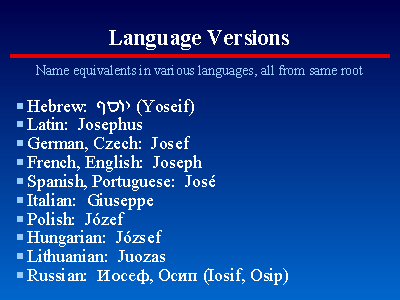 |
 |
Most Biblical names have versions in every European language, because western Christian nations share some of their cultural roots with Jews. Biblical names came into European languages from Hebrew via Greek and Latin. If the English equivalent name was considered "fashionable" at that time, that name was most often the one adopted by an immigrant.
However, there were no rules forcing an immigrant to adopt the language-equivalent name as their new name. In my study of immigrant name adaptations, 77% of those with the Hebrew name 'Avraham' took the English name 'Abe' or 'Abraham'; 94% of those named 'Binyamin' became 'Ben' or 'Benjamin'; 94% of 'David's became 'David'. These are all the English language equivalent names.
But the English equivalent name was not always the name chosen. For example, despite the fact that the English-language version of the Hebrew name 'Moshe' is Moses, only 4% of those named 'Moshe' became 'Moses' — 78% became 'Morris'. None of those named 'Yechezkel' became 'Ezekiel'; none of the 'Shimshon's became 'Samson' — because these were not popular American names at the time.
Note that there are no equivalent European-language versions of most post-Biblical Jewish names — there is no English version of 'Nachman' or 'Fruma', etc. And the same is true in reverse — there is no Hebrew or Yiddish version of 'George' or 'Herman', names with Greek and German roots. There is no common Biblical Hebrew root to go back to.